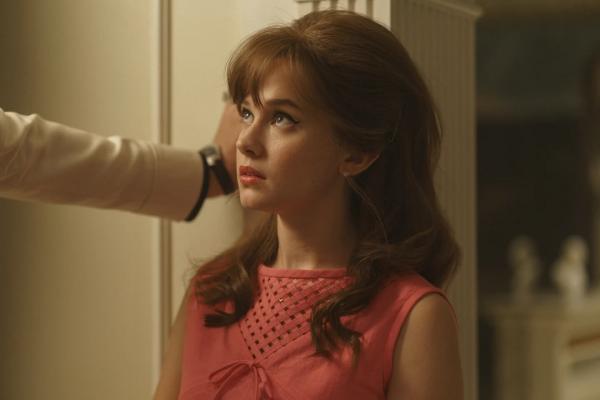When I entered the movie theater last week to see director Sofia Coppola’s Priscilla, I already had an idea about who Elvis Presley was: a talented, yet tortured artist who wrestled with the fame his platform brought him and who possessed a legion of fans that rivaled the length of his sideburns.
This understanding was in part shaped by Elvis (2022), in which director Baz Luhrmann’s presentation of the King of Rock ’n’ Roll reminded me of megachurch pastors: Elvis was a performer whose concerts were nothing short of spiritual experiences, and yet the bigger his platform got, the more he shunned community.
But in Priscilla, which is based off Priscilla Presley’s 1985 memoir Elvis and Me, we don’t primarily see Elvis through the eyes of his manager or adoring fans, instead, we see him through the eyes of the only woman he ever married, who he began courting when he was 24 and she was 14. The film follows Priscilla and Elvis’ 14-year relationship, and as her understanding of Elvis evolved, my own perspective changed too — not just on Elvis, but on charismatic figures from the stage to the pulpit.
Priscilla shows firsthand the ways charisma can be weaponized. By allowing viewers to see Elvis through Priscilla’s eyes, we see the danger of letting massive talent be a shield for a multitude of sins. Priscilla is a slow-burn. This insidious portrait of Elvis should cause a holy disturbance for the ways our spaces of gathering, from churches to workplaces, serve to reinforce the manipulative tactics of charismatic leaders.
Priscilla almost serves as a playbook of the tactics charismatic leaders deploy to those they prey on. In particular, the way charisma is weaponized to camouflage abuse. Sojourners’ podcast Lead Us Not, which explores how communities move forward in the aftermath of their leaders committing sexual and spiritual abuse, explains how a common tactic of abusive and charismatic leaders is to make you feel seen. This sense of belonging instills a false sense of trust. For example, in Priscilla, Elvis displays some consideration for the power imbalance in his relationship. Priscilla confirmed that, because of their 10-year age gap, she and Elvis were not intimate until they were married in 1967, when she was 21 years old, a choice that Elvis made.
However, more often, Elvis took advantage of her loyalty and naivete, even while praising her for her maturity. When Elvis (played by a towering Jacob Elordi) courts Priscilla (Cailee Spaeny in a masterfully controlled performance) at the start of the film, he makes her feel fortunate that she’s been chosen. Out of all the girls the superstar could be with, he’s picked her. Given how quickly someone like him was willing to get so close with someone like her, Priscilla almost feels as if he’s doing her a favor. “Why you?” her mother asks, and although Priscilla wonders the same, her gratitude quickly eclipses her curiosity. It becomes evident that although the two have seemingly “chosen” each other mutually, Elvis is the one who holds the power in the relationship — and he wields it maliciously.
Once Priscilla moves in with Elvis and he begins to star in films, tabloids suggest that he may be having affairs with his co-stars. When Priscilla confronts Elvis about this, he threatens to send her back to her home, saying, “I need a woman who understands that things like this might happen. Are you gonna be her or not?” She tearfully remains in line, enduring this emotional abuse and more, in order to still have access to him. As their relationship progresses, Elvis begins to berate Priscilla like a child, often sounding more like a manipulative father than a doting husband; she is never his equal.
Even when Elvis lashes out at Priscilla in public, their community never steps up to support her. In Lead Us Not, host Jenna Barnett explains that “churches and organizations can easily become dependent on a charismatic leader, both financially and ideologically. If [the leader] goes down, we all go down with him.” Elvis surrounded himself with “yes men” who have a vested interest in maintaining his success at any cost. Elvis’s unraveling would be their own undoing.
In one sequence, Elvis plays demos of songs to his friends and Priscilla, asking for their feedback. While his friends offer encouragement, Priscilla is slightly more critical. To this, Elvis throws a chair at her, narrowly missing. He then walks over and embraces her, sickeningly mumbling an apology, as if he accidentally broke a glass instead of trying to physically hurt her.
While Priscilla, who is an executive producer of the film, shared that she was initially concerned with Coppola’s vision for the film, she ultimately came out in support, sharing, “I think it’s right on, to be honest with you ... I have no problems with what she did in any way.” Scenes like the one mentioned are drawn directly from Priscilla’s memoir with no embellishment, and in some cases, the film even tames some of the abuse that Priscilla recounts (in particular, one sequence where Priscilla is sexually assaulted by an intoxicated Elvis).
Not everyone in the Presley family is pleased with Coppola’s portrayal. Elvis’s estate denied the use of his songs in the film. As an explanation for the estate’s actions, Coppola shared, “They don’t like projects that they haven’t originated, and they’re protective of their brand.” Lisa Marie Presley, the late daughter of Elvis and Priscilla, read a script of the film before it commenced production, and spoke out against the film before her passing, telling Coppola, “My father only comes across as a predator and manipulative. As his daughter, I don’t read this and see any of my father in this character.”
Perhaps Elvis’s estate and Lisa Marie were right to fear the film; I definitely walked out of Priscilla having a less favorable view of Elvis. But mainly, when I left the theater, I wasn’t thinking about Elvis. I was thinking about Priscilla. Thankfully, Coppola wasn’t concerned with protecting the brand of a charismatic figure. Instead, she prioritized telling Priscilla’s story as truthfully as possible. While she may not be the charismatic leader on stage, her story is more important. If the church and society is ever going to wean itself off of its dependency on and fascination with charismatic leadership, we have to create less biopics and podcasts that center the charismatic man, and more stories like Priscilla, that center the stories of survivors.
Got something to say about what you're reading? We value your feedback!







